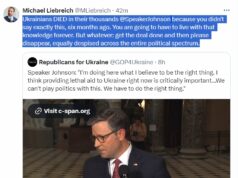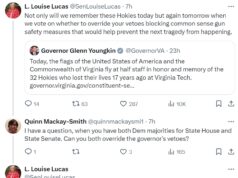by Ivy Main, cross posted from Power for the People VA
Today the Sierra Club filed a petition with the Virginia State Corporation Commission seeking a Declaratory Judgment that Dominion Virginia Power’s arrangement to obtain gas capacity in the Atlantic Coast Pipeline is subject to Commission approval under the Virginia Affiliates Act. That law requires a public service corporation to get the approval of the Commission before it enters into a “contract or arrangement” with an affiliated company.
The Affiliates Act applies, according to the Sierra Club, because Dominion Virginia Power’s parent corporation, Dominion Resources, is a partner in the Atlantic Coast Pipeline joint venture, and Dominion Virginia Power’s (DVP) fuel procurement subsidiary, Virginia Power Services Energy Corporation (VPSE), contracted for capacity on the pipeline. Put more simply, a utility—Dominion Virginia Power– and two of its corporate affiliates have negotiated a business deal, and the Affiliates Act directs the Commission to carefully review that deal to ensure that consumers don’t get the short end of the stick.
If the Commission grants Sierra Club’s petition, DVP will have to submit its agreement with Atlantic Coast to the Commission for formal review and approval. Sierra Club and other interested parties will then have a chance to weigh in on whether the agreement will actually benefit consumers.
There is good reason to think it won’t benefit consumers. Bill Penniman, a retired energy attorney who serves as Conservation Co-Chair for the Virginia Chapter of the Sierra Club, has studied Atlantic Coast’s filings with the Federal Energy Regulatory Commission (FERC). He notes that as of now, the amount of money that DVP (via VPSE) will pay Atlantic Coast for pipeline capacity is secret. The public filings reveal, however, that the maximum amount Atlantic Coast can charge any customer is more than three times the amount that another company, Transcontinental, can charge for pipeline capacity that services the exact same power plants as Atlantic Coast. And as it happens, says Penniman, DVP already has twenty-year shipping agreements with Transcontinental. The fact that DVP is now trying to enter into a whole new contract to ship gas to the same power plants via a much costlier pipeline ought to raise a lot of eyebrows.
If this talk of parent companies and subsidiaries is confusing, it might help to picture Dominion Resources as a giant spider with DVP as one leg and other Dominion-owned companies as other legs. Some of those legs have hairs on them; they are subsidiaries of the subsidiaries, but still part of the spider. VPSE is a hair on the DVP leg; its job is to buy fuel and whatever else the utility needs to run its power plants and make electricity.
In this case, VPSE has contracted with Atlantic Coast to buy a big chunk of space on the pipeline. DVP will use this pipeline capacity to deliver the gas needed to fire its Greenville and Brunswick facilities. Yet another leg on the spider, Dominion Transmission, has been hired to build and operate both Atlantic Coast and a connecting line called the Supply Header (which ups the price of the whole system).
To top it all off, the spider itself, Dominion Resources, owns 48% of the Atlantic Coast venture, along with Duke Energy and Southern Company. You can picture the Dominion spider teaming up with its spider buddies on the project, but I don’t recommend that if you tend towards arachnophobia and are already not happy with this analogy.
Having VPSE contract for capacity on Atlantic Coast is absolutely critical to the success of the whole pipeline venture. Atlantic Coast can’t get permission from the Federal Energy Regulatory Commission (FERC) to build the pipeline unless it can show the pipeline is needed, and the only way to show need is by having customers lined up to buy the capacity. If VPSE didn’t sign that contract, Atlantic Coast couldn’t get built.
But here’s the thing: while FERC has final authority for approving or rejecting the pipeline itself, Virginia’s State Corporation Commission has authority to decide whether any agreements between regulated utilities and their corporate affiliates are in the public interest. In fact, the law says that the Commission must review and approve inter-affiliate agreements before they take effect.
However, even though DVP has directed VPSE to buy pipeline capacity on Atlantic Coast for DVP to use at its power plants, DVP has never submitted VPSE’s arrangement with Atlantic Coast for Commission review. Atlantic Coast has assured FERC it has enough customers to justify building the pipeline, but the fact of the matter is, one of its key customers—VPSE (and, by extension, DVP)—may not have had authority to enter into the deal in the first place.
This is what the Affiliates Act is supposed to prevent. Virginia Code section 56-77 says that any “contract or arrangement” between a public service company and an affiliated interest for goods, property, or services requires prior approval from the Commission. The fact that VPSE is acting as a contractual middle man between DVP and Atlantic Coast makes no difference: this is an arrangement between DVP, VPSE, and Atlantic Coast that is made specifically for the benefit of DVP. They’re all the legs (and leg-hairs) of the same spider, and they are likely to put the spider’s welfare above anyone else’s. And that’s exactly the reason the General Assembly passed the Affiliates Act.
The Atlantic Coast Pipeline is a big deal for Dominion Resources. The company is all-in on natural gas, and building this $5 billion pipeline is expected to generate a lot of profit for shareholders. What’s missing from this equation is the public interest, and there are good reasons for the Commission to be skeptical. How does it benefit Virginians to construct an extraordinarily expensive pipeline when much cheaper pipeline capacity already exists? That’s the question the Sierra Club will pose to the Commission if grants the petition and requires DVP to submit its Atlantic Coast agreement for review.
Furthermore, why should DVP commit itself (and its customers) to a huge amount of natural gas capacity over twenty-year period when there are better, cleaner options available? While Dominion and all its spider legs may think that burning more gas is a great idea, the reality is, natural gas increasingly looks less like a long-term energy solution and more like a trap for companies that made the wrong bet. At the same time, renewable energy and efficiency resources are growing ever cheaper. The Commission might well question Dominion’s plan to lock its customers into a bad investment in fossil fuels over the next twenty years at the expense of smarter renewable alternatives.
There’s a reason the Affiliates Act exists, and this is it. Here’s hoping the Commission grants Sierra Club’s petition and gives the Dominion spider a good, hard look under the microscope.


 Sign up for the Blue Virginia weekly newsletter
Sign up for the Blue Virginia weekly newsletter

![Tuesday News: “Johnson gambles on plan separating Israel aid from Ukraine funds”; “It Took One Day for Trump to Get in Trouble at His First Criminal Trial”; “If [Youngkin] wanted to write bills, he should have run to serve in the General Assembly”](https://bluevirginia.us/wp-content/uploads/2024/04/trumptrial-238x178.jpg)






